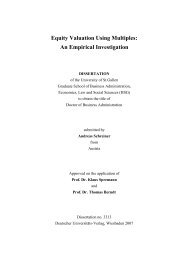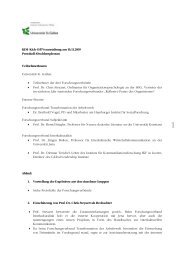Bedarfsanalyse fachlicher Metadaten - Universität St.Gallen
Bedarfsanalyse fachlicher Metadaten - Universität St.Gallen
Bedarfsanalyse fachlicher Metadaten - Universität St.Gallen
Sie wollen auch ein ePaper? Erhöhen Sie die Reichweite Ihrer Titel.
YUMPU macht aus Druck-PDFs automatisch weboptimierte ePaper, die Google liebt.
Beitrag A.2 53<br />
7 Beitrag A.2: Use Cases for Business Metadata – A<br />
Viewpoint-Based Approach to <strong>St</strong>ructuring and Prioritizing<br />
Business Needs<br />
Titel<br />
Autoren<br />
Use Cases for Business Metadata – A Viewpoint-Based Approach to<br />
<strong>St</strong>ructuring and Prioritizing Business Needs<br />
Daniel <strong>St</strong>ock, Felix Wortmann, Jörg Mayer<br />
Universität <strong>St</strong>. <strong>Gallen</strong>, Institut für Wirtschaftsinformatik<br />
Müller-Friedberg-<strong>St</strong>raße 8, 9000 <strong>St</strong>. <strong>Gallen</strong>, Schweiz<br />
{daniel.stock | felix.wortmann | joerg.mayer}@unisg.ch<br />
Publikationsorgan In: BIS 2010 Workshops (2010), S. 226-237<br />
Tab. 9: Bibliografische Angaben zu Beitrag A.2<br />
Business metadata plays a crucial role in increasing the data quality of information<br />
systems. Despite its importance, business metadata is primarily discussed from a technical<br />
perspective, while its business value is scarcely addressed. Therefore, this article<br />
aims at contributing to the further development of existing design approaches by explicitly<br />
accounting for the use cases of business metadata. In the course of this article,<br />
a classification of use cases will be developed, which can be utilized when identifying<br />
the respective informational requirements a business metadata system needs to satisfy.<br />
A banking case is presented that demonstrates how this conceptual model has successfully<br />
been applied in practice.<br />
Keywords: business metadata, requirements engineering, user acceptance<br />
7.1 Introduction<br />
7.1.1 Motivation and Objectives<br />
In recent years, the challenge of “making better use of information” has gained importance<br />
and now ranks among the top five priorities of IT executives [Luftman, Kempaiah,<br />
Rigoni 2009: 151-152]. This trend is linked to the prevailing significance of<br />
Business Intelligence (BI), where data quality is a crucial factor for the perceived net<br />
benefits to the end user [Luftman, Kempaiah, Rigoni 2009; Sabherwal, Jeyaraj, Chowa<br />
2006: 1857-1859; Wixom, Watson 2001: 34]. In this context, the scope of data quality
















